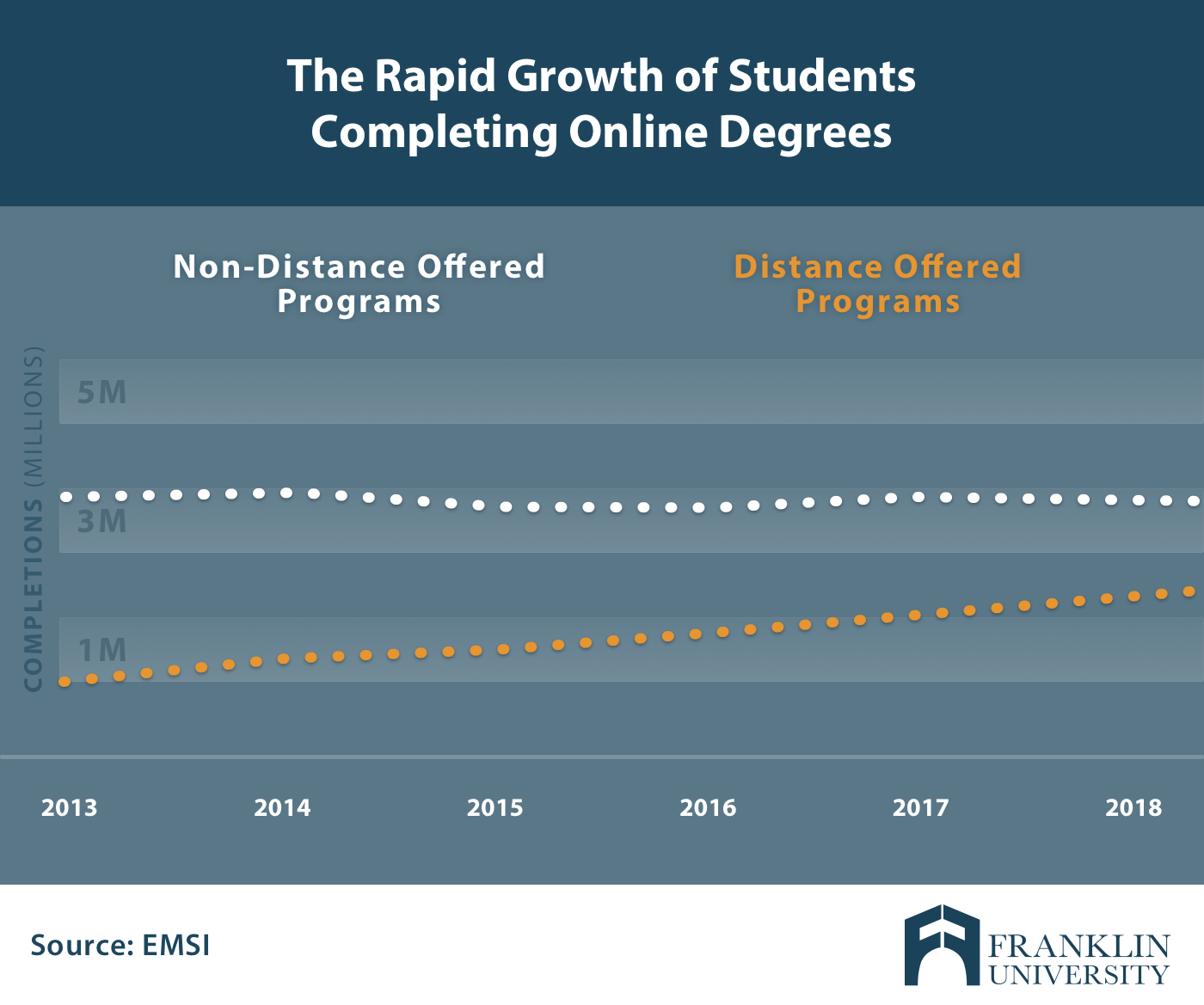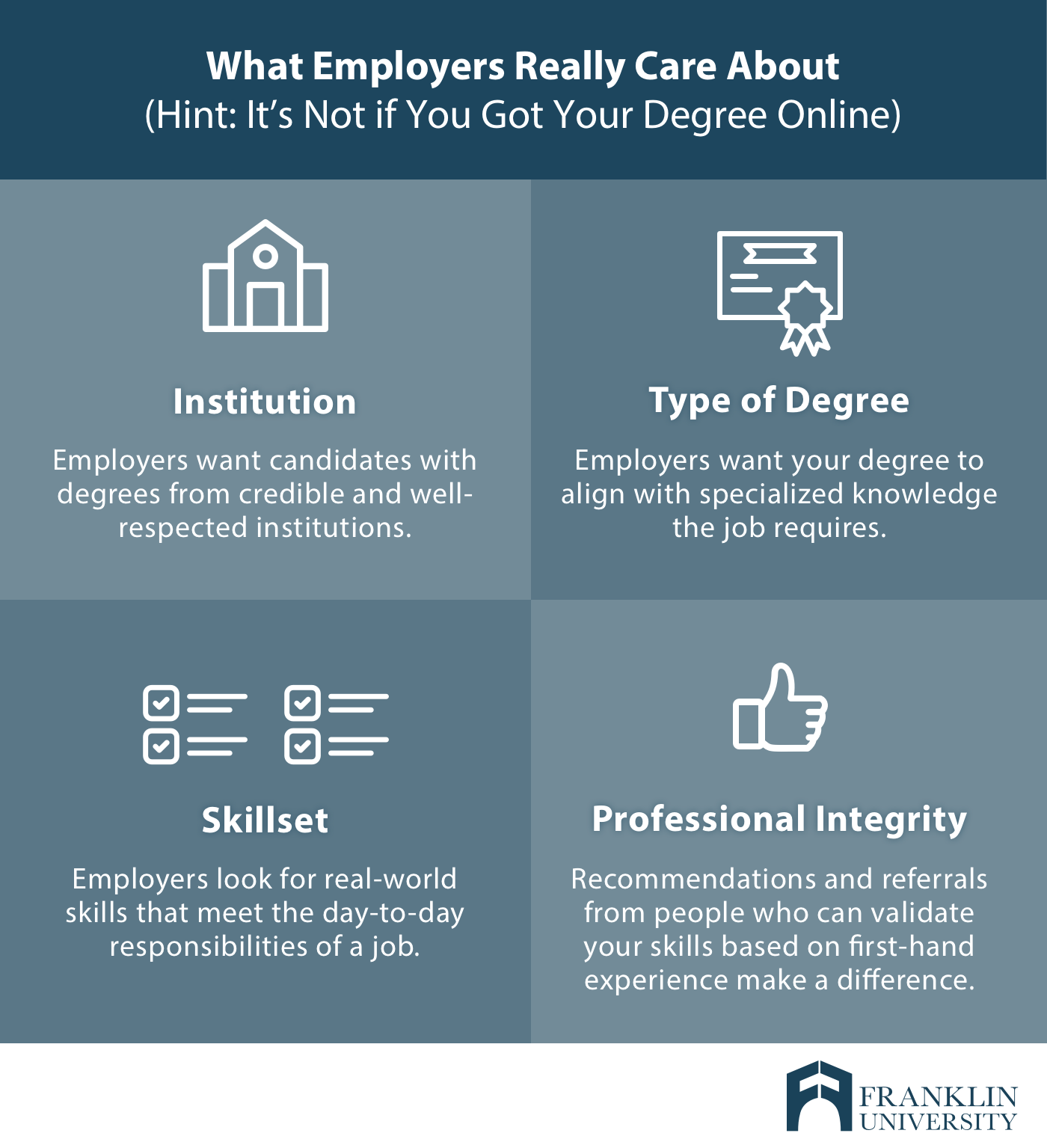Request Information
We're Sorry
There was an unexpected error with the form (your web browser was unable to retrieve some required data from our servers). This kind of error may occur if you have temporarily lost your internet connection. If you're able to verify that your internet connection is stable and the error persists, the Franklin University Help Desk is available to assist you at helpdesk@franklin.edu, 614.947.6682 (local), or 1.866.435.7006 (toll free).
Just a moment while we process your submission.

Are Online Degrees Worth It?
Online degree programs aren’t just popular—they’re becoming a norm in higher education. For many colleges and universities, the demand for more accessible, flexible and affordable education has them turning to online learning.
The shift from traditional to online education is especially apparent when looking at degree completion trends. According to labor market analytics firm Emsi, from 2013 to 2018, degree completions for online programs increased by 30.4%, while the number of degrees completed in non-distance programs actually decreased by 1.2%.

But as more and more institutions double down on online degree programs, how can you determine the best from all the rest? We created this guide to help you find out if an online degree is credible and a worthwhile investment.
Are Online Colleges Credible? Here’s How to Tell.
Getting a degree is a large investment of time, energy and money. You want to make sure that getting your online degree will be worth it.
Choosing a reputable online college with high-quality programs, dedicated support services, and proven outcomes is key to success. Here are four things to do when evaluating the credibility of online colleges.
- Make sure you know if an online college is accredited—and what type of accreditation it has. Accreditation is the gold standard of quality in higher education. If you’re looking for a program that passes the strictest quality standards, look for a regionally-accredited online college. Also, look research if the degree program you want to pursue is accredited, as individual programs, like nursing or business, have their own accrediting bodies.
- Be extra mindful when evaluating for-profit online colleges. Some for-profit institutions have a track record of producing inferior outcomes when it comes to online education. However, government regulation helped rein in some of the worst offenders. Now, some for-profit institutions have turned a corner, while others still put profit over student experience. If you’re considering a for-profit institution, do in-depth research to ensure it’s a high-quality school with demonstrated student success.
- Look at completion percentages to see how many students finish their degrees. Completion percentage is a good indicator of program quality and student support services, as well as a sign that students find their education worthwhile.
- Talk to someone who has firsthand experience at the college or university. There’s only so much information you can gain through online research. Reach out to the institution to talk with admissions and faculty. Try to talk to a current student or alum. Talking to these people will help you get a complete picture of the student experience.
When it comes to paying for school, grants are among your best options. But do you know how to find them? Remove the guesswork by downloading this free guide.
Are Online Degrees Respected by Employers?
This is a question many potential online learners ask. But it’s also a misleading question because online degrees aren’t different than in-person degrees. The credential is the same—it’s only the way you take classes that differs. So when a potential employer looks at your resume, they won’t know if you got your degree online unless you tell them. But even if they do—it’s not something you should worry about.
“There may have been a stigma around online colleges in the past, but the quality of online instruction has come so far,” says Dr. Joel Gardner, assistant dean, Instructional Design at Franklin University. “Now, online programs are not only on-par with in-person education, but some studies indicate they may surpass the effectiveness of face-to-face instruction.”
Today’s employers are looking at more than whether you got your degree online or in-person. What they’re really looking at is your school, type of degree, skillset and professional integrity.

If these are the criteria employers care most about, how can you make sure an online college will prepare you to succeed? Here’s what to look for to make sure your resume stands out:
- An institution that is regionally accredited. Bonus points for institutions with program-specific accreditation.
- Look for online colleges with programs and curriculum that’s up-to-date with industry best practices. New programs in specialized areas and regularly updated curriculum are signs of innovative online colleges.
- Find an online program that focuses on professional application, not just academic theory. Signs of these programs are hands-on simulations, collaborative projects, and the use of industry-standard tools.
- One of the benefits of getting your degree is growing your professional network—and online degrees are no different. Find a program with industry partnerships, relationships with professional societies, mentorship opportunities, and faculty who are industry practitioners.
7 Advantages of Online Degrees for Working Adults
Getting a degree as a working adult is very different than as a traditional undergraduate student. As a working professional, you’re already balancing career, personal and community responsibilities. Even when completing your degree is a priority, you need a program that caters to your unique needs.
Here are seven reasons an online college is an excellent option for adults looking to advance their careers.
- Online programs allow you more flexibility—from when you take classes to when you complete assignments. A lack of scheduling conflicts can also positively impact retention rates.
- You can often earn your degree faster than a traditional program. On the other hand, if you have a busy schedule with many personal and professional commitments, you can also take one course at a time. Ultimately, the pace you complete your degree is up to you.
- Online degrees designed for working adults focus on skill-building, rather than just theoretical comprehension. The right program will teach you skills you can use on the job in your current role while preparing you for advancement.
- Advanced technology provides the ability to create more engaging content. It allows you to easily collaborate with classmates and connect with instructors, so you don’t lose out on the interactive aspect of traditional courses.
- Online programs usually include more frequent check-ins and evaluations, which allow faculty to intervene more quickly if a student falls behind.
- Participation is expected in online coursework. You can’t hide at the back of a lecture hall, you have to actively participate, which can help you learn the material more effectively.
If these advantages resonate with you, an online degree might be the next step in furthering your career.
If You’re the Right Type of Student, an Online Degree is Worth It
You understand the merits of an online degree. Now, you need to find an online college that aligns with your unique needs and professional goals.
Franklin University is dedicated to creating online degree programs designed for working adults by:
- Maximizing transfer credit—more than 90% of our students transfer credit from other schools.
- Offering flexible scheduling and accelerated degree programs.
- Bringing real-world perspectives to courses through experienced faculty and industry-relevant curriculum.
- Creating engaging courses that use cutting-edge and collaborative technology.
Explore Franklin University’s extensive list of degree programs to find the right online degree for you.





